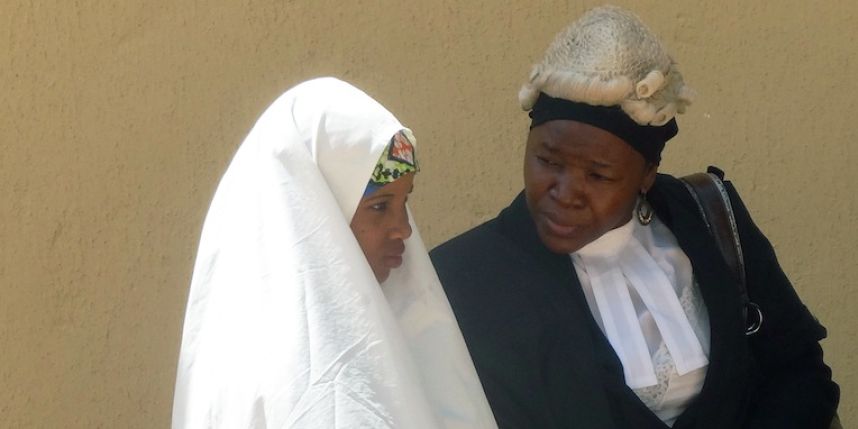A teenage girl threatened with the death penalty for murdering her 35 year-old husband in Nigeria, faces an uncertain future after being released from prison.
15 year-old Wasila Tasi’u was accused of killing Umar Sani and three other men with rat poison shortly after they were married. She has spent the last 10 months locked up as her case dragged on, held up by judicial staff strike action and administrative delays.
Speaking to the Guardian, Tasi’u’s lawyer, Hussaina Ibrahim from the International Federation of Women Lawyers (FIDA), said her client has no hope of returning home, such was the publicity garnered by the case.

With Ibrahim’s help, a foundation has taken on Tasi’u’s case and the hard work of returning her to normal life. The Isa Wali Empowerment Initiative which aims to get young girls into education, will support Tasi’u in the months to come. She will live with a foster family, for the foreseeable future.
Maryam Uwais, a lawyer based in Nigeria who has been following the case contacted the Guardian to say she had spoken to Tasi’u shortly after her release, who “overjoyed” at her new found freedom.
“Apprehension, relief and then gratitude were emotions that were manifest today, upon the release of Wasila,” she said.
“An entirely avoidable tragedy, leaving in its wake four dead men and a thoroughly traumatised little girl. Poison; the only feasible escape to freedom, devised from the wild imagination of a naive, depressed, little girl caught up in a painful, forced marriage to a much older man. A tough lesson for families, communities and a government that is still ambivalent about sanctioning the perpetrators of child marriage.”
Ibrahim says her client, bubbly and full of life when she met her for the first time, has become more withdrawn, quiet and even depressed during her time in jail. Educational opportunities are limited in the prison in Kano city where she has been held, and to this day Tasi’u can neither read nor write.
Throughout her trial, which was conducted in English meaning the defendant could not understand a word, Tasi’u was threatened with execution. Reporters in court described her struggling to control her emotions during proceedings, frequently breaking down in tears.
In the weeks since Prosecutor Lamido Abba Soron-Dinki asked the high court in Gezawa, Kano state, to “terminate the case” of culpable homicide against Tasi’u in May, her visitation rights have been limited with even her family prevented from seeing her. Ibrahim’s lawyer has been stopped from being her young teenage daughter to see Tasi’u, depriving the child of one of her few regular interactions with people her own age.
“I think they were worried that she would try to escape,” said Ibrahim, when trying to offer an explanation for the cut in visiting rights, in the weeks after her release was first mooted.
The case has drawn international condemnation from rights groups, who say the decision to pursue the death penalty against a teenager violates international law. Others have characterised Sani and Tasi’u’s relationship as one characterised by “systematic abuse”.
After a presentation was made to the court by Kano’s attorney general on Tuesday, calling for the defendant to be released, Judge Mohammed Yahaya agreed to drop the charges and allow Tasi’u to be free.
In Nigeria, child marriage is common, despite national laws prohibiting it.
The Child Rights Act, introduced in 2003, raised the minimum age of marriage for girls to 18, but the legislation has not been ratified by states in the Muslim-dominated north of the country where child marriage is common, with nearly half of girls married by the age of 15 and 78% by the time they hit 18. In the country as a whole, 7% of girls in the country are married before the age of 15, according to the charity Girls Not Brides.
The Kano state government has agreed to offer compensation to Sani’s family, according to local reports.
The charity Girls Not Brides, which has campaigned extensively on the issue of child marriage in Nigeria and beyond, issued this statement on Tasi’u’ release.
“Wasila’s case reflects some of the impossible situations that child brides face. Wasila is one of 15 million girls a year who are married as children, a practice that is not limited to any one region, culture or religion. Her case demonstrates the importance of not only preventing child marriage but also ensuring that child brides receive the support and services they need.”







![Canadian Senate Commends Burna Boy, Notes Grammy Winner’s Sold Out Shows [WATCH] entertainment activities Nigerian Singer Burna Boy](https://www.thetrentonline.com/wp-content/uploads/2019/11/https___cdn.cnn_.com_cnnnext_dam_assets_191001102612-burna-boy-at-coachella.jpg)



